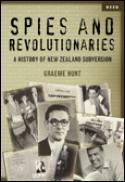Graeme Hunt's Book on New Zealand Spies and Revolutionaries – Chapter Two
Scoop is serializing the first 1000 words of each chapter of author Graeme Hunt's latest book: Spies And Revolutionaries – A History of New Zealand Subversion. Click here for Chapter Two: French, Russians and Fenians
 The history of New Zealand's intelligence agencies and
those it has spied on have been laid bare in a book by
Auckland-based journalist, author, and historian Graeme
Hunt.
The history of New Zealand's intelligence agencies and
those it has spied on have been laid bare in a book by
Auckland-based journalist, author, and historian Graeme
Hunt.
Spies And Revolutionaries – A History of New Zealand Subversion details how several prominent New Zealanders, all of whom are dead, spied for the former Soviet Union during the Cold War. Accusations and suspicions are laid bare before files and information that has never before been made public. This book will clearly recharge debate as to whether Dr Bill Sutch, diplomat Paddy Costello, and public servant Ian Milner were spies acting against New Zealand's national interest.
CHAPTER TWO: French, Russians and Fenians
 It
was natural for the British settlers in New Zealand from the
1830s onwards to bring with them ‘baggage’ from the old
country in terms of prejudices against Continental
nationals, notably the French and the Dutch. France had been
an age-old enemy, soundly defeated at Waterloo in 1815, but
was now a rival in the dawning age of South Pacific
colonialism. The Dutch, once-mighty maritime rivals, were
minor players in the colonial stakes but had an historical
connection with New Zealand by virtue of their countryman,
Abel Tasman, having ‘discovered’ what he called Staten
Landt in 1642.1 That was all Tasman did. He did not claim
New Zealand as a Dutch possession. One hundred and
twenty-seven years later –– in 1769 –– an
Englishman, Lieutenant James Cook, took possession of the
islands in the name of King George III, pipping French
explorer Jean François de Surville by two months.
It
was natural for the British settlers in New Zealand from the
1830s onwards to bring with them ‘baggage’ from the old
country in terms of prejudices against Continental
nationals, notably the French and the Dutch. France had been
an age-old enemy, soundly defeated at Waterloo in 1815, but
was now a rival in the dawning age of South Pacific
colonialism. The Dutch, once-mighty maritime rivals, were
minor players in the colonial stakes but had an historical
connection with New Zealand by virtue of their countryman,
Abel Tasman, having ‘discovered’ what he called Staten
Landt in 1642.1 That was all Tasman did. He did not claim
New Zealand as a Dutch possession. One hundred and
twenty-seven years later –– in 1769 –– an
Englishman, Lieutenant James Cook, took possession of the
islands in the name of King George III, pipping French
explorer Jean François de Surville by two months.
Britain did nothing to uphold Cook’s claim for more than 60 years. Although the first governor of New South Wales, Captain Arthur Phillip, had the right to include New Zealand within his legal jurisdiction after 1788, he too did nothing. A later governor, Major-General Lachlan Macquarie, alarmed at reports from New Zealand of European lawlessness and mistreatment of Maori, issued an order in 1813 stating that no ship would be allowed to sail to New Zealand unless it posted a good behaviour bond of £10002 and that lawbreakers would be punished. He also appointed Anglican missionary Thomas Kendall resident magistrate.
Macquarie’s powers were strengthened in 1817 by legislation from the Imperial Parliament in London but there was no restatement of the sovereignty Cook had claimed in 1769. In 1819 Macquarie made one of Kendall’s fellow missionaries, John Butler, a justice of the peace, but the appointment was more symbolic than real as New Zealand, or Maoriland3 as some missionaries and traders later called it, was still outside the British Empire.
It was up to the established Church of England to take the initiative. It had a powerful incentive to act, as France, the European power most interested in the South Pacific, was overwhelmingly Roman Catholic. The Church of England’s proselytising arm, the Church Missionary Society, saw Catholicism as a threat to the heathen populations of the South Seas. So, long before organised British settlement of New Zealand, Anglican missionaries (followed closely by Wesleyans) embarked on their own form of colonisation –– a systematic campaign to capture the souls of ‘savages’.
When the senior Anglican chaplain to the New South Wales penal colony, Samuel Marsden, conducted the first religious service in New Zealand, at Rangihoua in the Bay of Islands on Christmas Day 1814, there was no New Zealand as we know today –– no administration, no infrastructure and no rule of law. But Marsden’s action was a signal to the Colonial Office in London and to British politicians generally that New Zealand would be British and Protestant.
There was little response from Whitehall or Westminster; Britain was preoccupied with Continental affairs after the abdication of Napoleon in April 1814, and was in the final stages of helping redraw the map of Europe at the Congress of Vienna.
France had restored the Bourbons to the throne and rejoined the ranks of civilised nations. Other monarchs deposed by Napoleon were also being restored. Peace had come at last –– or so war-weary Britain thought. (Napoleon would escape from Elba in February 1815 and resume the war, only to be defeated finally by British and Prussian forces at Waterloo in June 1815.)
Marsden and the Church Missionary Society, so far from the affairs of Europe, had no choice but to go it alone in New Zealand. They took up the challenge zealously and Christianity was spread steadily throughout the country. The 200–300 British living in New Zealand by 1830 were far less tolerant of the ‘new France’ Britain had helped create. They remained fervently anti-French and when word came that an eccentric French aristocrat- adventurer, Charles, Baron de Thierry, planned to establish an independent colony in New Zealand with himself as its head, they were up in arms. They were not won over by the fact that de Thierry was a Protestant.
De Thierry had masterminded his colonial dream at the University of Cambridge, England, in 1820 with the help of Anglican missionary Thomas Kendall, who was visiting Cambridge with Ngapuhi warlord Hongi Hika and his nephew, Waikato, officially to help compile a Maori dictionary. The plan involved acquiring more than 16,000 ha of land on the Hokianga to establish the colony. The price paid for the land was 36 axes and the deed was executed in 1822.
The financially strapped de Thierry, whose parents had fled revolutionary France in 1793, failed to win British, Dutch or French support for the venture, despite claiming that Britain had repudiated sovereignty over New Zealand. He was jailed for debt in 1824 and in 1826 was forced to flee to England to escape creditors after a Paris business he had an interest in failed. Nine years later –– in 1835 — after assembling a military force in Tahiti, de Thierry restated his grandiose aim of becoming ‘sovereign chief of New Zealand’. This so alarmed James Busby, the British resident at Waitangi, and British settlers that Busby persuaded 35 northern Maori rangatira to sign a declaration of independence of New Zealand and seek Crown protection. There was little else he could do. Four years earlier, at the urging of the Church Missionary Society, 13 rangatira at the Bay of Islands had appealed to King William IV for protection, leading to Busby’s appointment in 1833. Without administrative powers and a police force, Busby was a ‘man-o’-war without guns’, able to talk tough but unable to act.
See Also:
Scoop is serializing the first 1000 words of each chapter of author Graeme Hunt's latest book: Spies And Revolutionaries – A History of New Zealand Subversion.
SRP: $29.99
ISBN:
9780790011400
340p, includes index, black and white
photos
Reed Publishing (NZ) Ltd www.reed.co.nz
Release: August 6 2007
For more, see… Reed Publishers, Spies And
Revolutionaries



 Keith Rankin: Equity Rights - UBI, SUI, BUI, HUI, Or GUI?
Keith Rankin: Equity Rights - UBI, SUI, BUI, HUI, Or GUI? Binoy Kampmark: The Inevitable Souring - Elon Musk Falls Out With Donald Trump
Binoy Kampmark: The Inevitable Souring - Elon Musk Falls Out With Donald Trump Ian Powell: Postscript On Ethnic Cleansing, Genocide And New Zealand Recognition Of Palestine
Ian Powell: Postscript On Ethnic Cleansing, Genocide And New Zealand Recognition Of Palestine Gordon Campbell: On Why Leakers Are Essential To The Public Good
Gordon Campbell: On Why Leakers Are Essential To The Public Good Ramzy Baroud: Global Backlash - How The World Could Shift Israel's Gaza Strategy
Ramzy Baroud: Global Backlash - How The World Could Shift Israel's Gaza Strategy DC Harding: In The Spirit Of Natural Justice
DC Harding: In The Spirit Of Natural Justice